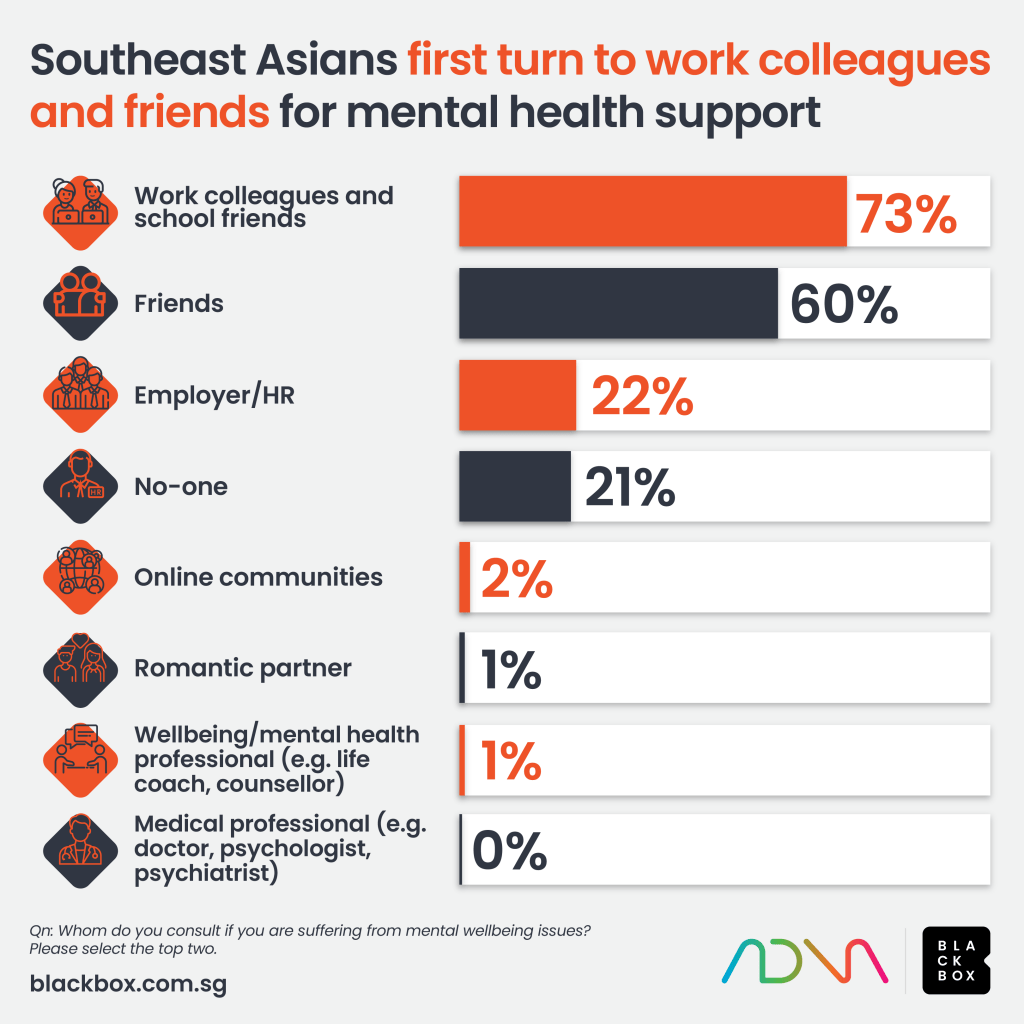Mental Health and the Workplace: The Toll of Unhappy Employees
As people navigate the challenges of their personal and professional lives in today's ultra-competitive world, the workplace emerges as a critical arena where mental health battles are fought but not always won. The interplay between mental wellness and productivity has become a central concern for employers and HR professionals. Our study, "Unmasking Mental Health in Southeast Asia," conducted in collaboration with ADNA, delved deep into the state of mental health across Singapore, Malaysia, Philippines, Thailand, Vietnam, and Indonesia. The study, which includes insights from over 9,000 respondents, highlights the factors affecting mental well-being and the role of various elements, including work pressures, relationships, and societal dynamics.
Bearing the Weight: How Work Pressure Impacts Mental Health
One of our study's most striking revelations is the significant impact of work-related pressures on mental well-being. When asked about the factors most affecting their mental health, more than one-in-four (27%) Southeast Asians identified "work pressure/career struggles" as a leading concern. This ranked second only to money problems, which were selected by 31% of respondents.
When we look at age groups, workplace pressure is felt most among individuals aged 35 to 49, with a notable 45% selecting it as a top factor impacting their mental health. Drilling down to the country findings, work pressure emerged as the primary challenge to the mental well-being of Vietnamese (37%) and Singaporeans (31%) most.
This age group also reported experiencing feeling frequently demotivated at work (38%). This was in response to our question, “Which of the following do you experience frequently as a result of mental health challenges?”. Lack of job motivation emerged as among the top factors, second only to stress, with almost one in four Southeast Asians feeling demotivated about their careers. Interestingly, only 14% of those aged between 25 and 34 years share this sentiment, serving as a reminder that the quiet quitting phenomenon (a subtle form of leaving or giving up, often characterized by a gradual decrease in participation or effort) is not just another “young person thing” as commonly reported.
United by Support: The Power of Peer Relationships in Times of Need
Our study further highlighted the role of social networks in dealing with mental health issues. When asked about their go-to sources for seeking help with mental well-being challenges, a resounding 73% of respondents chose "work colleagues or school friends." This preference for peer support was particularly strong among Singaporeans, with 83% relying on their colleagues and friends. This underscores the importance of fostering a supportive work environment where employees feel comfortable seeking assistance from those around them.
Guiding Lights: Navigating Mental Health Advice for a Balanced Life
In exploring what individuals consider to be good advice concerning mental health, the study found that one in four (25%) respondents believed in "Seek support amongst people you value and trust." This choice resonates with the significance of creating a workplace environment where trust is nurtured, and peer connections are fortified. Notably, the option of "try to live life at a slower pace" closely followed, with 22% of respondents advocating for a more balanced and mindful approach to life. So, it is not just external support but also a change in the overall work culture that promotes one’s well-being. Today’s trends of quiet quitting and quiet firing serve as reminders to create a better work environment.
HR's Renaissance: Architects of Trust and Employee Well-being
The findings of our Unmasking Mental Health study reverberate across boardrooms, prompting a re-evaluation of how companies approach employee well-being. HR professionals are stepping into a new role that transcends traditional administrative responsibilities. Their capacity to create a workplace that prioritises mental wellness is increasingly becoming a determining factor in talent retention and overall company success.
Our survey reveals that merely 22% of Southeast Asians actively seek assistance from their employers or HR departments. Among individuals aged 35 and above, one in three engage with HR, indicating a relatively higher level of interaction in this age group. However, this engagement markedly declines within the younger demographic, with only 13% of those aged 25 to 34 accessing HR support. This disparity prompts questions about whether there has been a recent and drastic decline in employee trust in their employers or if the younger generation tends to be more sceptical in their approach.
In today’s work landscape, HR professionals are no longer confined to mere recruitment and benefits administration. They are now expected to be catalysts for cultural change, fostering an environment where trust and mental well-being thrive. A workplace that encourages open conversations about mental health, provides accessible resources, and promotes work-life balance can significantly contribute to employee satisfaction and, consequently, productivity.
Furthermore, HR professionals can lead the charge in destigmatizing mental health conversations. By enabling a culture of acceptance and understanding, employees can feel more comfortable seeking help without fear of judgment. HR can actively champion awareness campaigns, training sessions, and initiatives that educate the workforce about mental health issues, symptoms, and available resources.
Another instrumental step HR can take is advocating for flexible work arrangements. Recognizing that work-related stress can be exacerbated by long commutes and a lack of work-life balance, offering remote work options or flexible hours can go a long way in supporting employees' mental well-being.
Blackbox’s Take: Cultivating a Brighter, Mentally Stronger Workplace of Tomorrow
Our Unmasking Mental Health study underscores the undeniable link between employee happiness, mental well-being, and workplace productivity. As companies strive to navigate an ever-evolving landscape, HR professionals must rise to the occasion. They certainly have the audience for it! As our data shows, workplaces are a breeding ground of stress for Southeast Asians, but in what should be seen as a heartening statistic, many from the 35+ age group are also comfortable seeking support from their colleagues and HR departments. Getting the younger workforce to be more trusting of them is the challenge at hand and it all boils down to creating an environment of openness.
By nurturing trust, fostering open dialogues, and implementing targeted support systems, HR professionals can create workplaces that prioritise mental wellness, especially at a time when Southeast Asians seek to live life at a slower pace. In doing so, they not only contribute to the success of their organisations but also play a vital role in shaping a healthier and more empathetic society at large. The journey towards a mentally resilient workforce is ongoing, but with each step taken, we move closer to a future where individuals can thrive both personally and professionally.
This is the second article in an ongoing content series around the state of mental well-being in Southeast Asia. Through this study, we hope to engage with mental health advocates, HR professionals, government policymakers, and all stakeholders looking to influence and improve the way this persistent societal concern is acknowledged and addressed.


